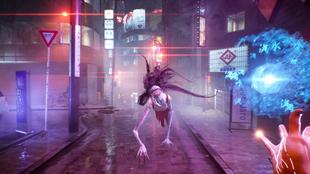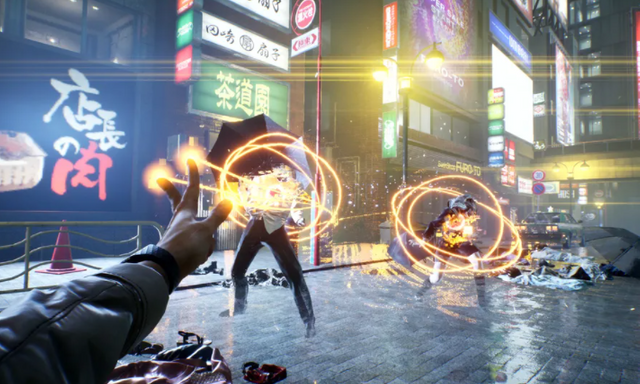Every so often a game comes along that surprises critics with a mix of exciting gameplay, a fun story and a rich game world.
'Ghostwire: Tokyo' ticks all those boxes.
This idiosyncratic action game from Tango Gameworks (of 'The Evil Within' fame) is the kind of game developers should be making all the time.
A wildly original story is coupled with some fantastic combat and a fun open-world to make for one of the year's most unique experiences.
The main hook of 'Ghostwire: Tokyo' concerns an eerie fog descending on Tokyo and players are tasked with finding out how to lift the fog and get to the bottom of the mystery.
The bustling metropolis of Tokyo is engulfed by a strange fog making its citizens disappear, turning this hive of activity into a ghost town.
Neon signs flicker, cars are left abandoned in the middle of the street and umbrellas are strewn across the game world.
Players are then tasked with finding out what the hell happened.
It's a simple elevator pitch, but the game goes in some surprising directions.
I'll be there in spirit
The buddy comedy at the centre of the game between KK and protagonist Akito makes for one of the best gaming duos this side of Sam and Max.
KK is a spirit in control of Akito's body, and the game gets a lot of mileage of the spirit of a grizzled ex-cop being trapped in the body of a young 20-something dweeb.
The pair are initially tense and terse towards each other, but the relationship between them is one of the game's strengths, and the pair develop a begrudging respect for each other over the course of the game.
KK acts as the player's eyes and ears in the field, letting players pull off the cool spirit-infused moves and giving them the lowdown on the strange and bizarre events.
Players will grow to love the pair and their hijinks, and this strong character work at the centre of the game keeps players engaged during the hours of wandering a deserted Tokyo.
A veritable who's who of the Japanese gaming industry worked on this game, with talent from 'The Evil Within', 'Silent Hill', 'Metal Gear Solid' and 'Tekken' working on the game.
The Japanese style of open-world games runs through the veins of 'Ghostwire: Tokyo' so players expecting a triple-AAA sandbox in the vein of 'Grand Theft Auto' or 'Horizon: Forbidden West' will be disappointed, but the Japanese open-world game is an art form in its own right.

Japanese game design focuses on having tighter, more compact open-world environments as opposed to massive, sprawling worlds, and in the context of 'Ghostwire: Tokyo' the tighter focus works wonders.
The streets of Tokyo will be familiar to those who have spent many happy hours taking lumps out of gangsters in the 'Yakuza' games, and 'Ghostwire: Tokyo' has one the most memorable depictions of the city in any form of media.
'Ghostwire: Tokyo' is one of the best-sounding games in recent memory, and with the Pulse 3D headset on PlayStation 5, the ghostly whispers and eerie atmosphere helps elevate the experience.
The game can be brilliantly spooky at times, too.
While 'The Evil Within' was as subtle with its horror as a pop-up screamer video, and 'Ghostwire: Tokyo' is more interested in the surreal than the outright scary.
There is always a palpable sense of tension around and players are left on guard which is the greatest compliment a player can give a game with horror elements.
Tokyo Story
As mentioned, the sprawling city turning into a ghost town is incredibly effective.
The main story is serviceable and trucks along nicely, but the true meat of the game lies in the side quests.
Through the side-quests, the game stretches out into a quirky and kooky jaunt through Tokyo, and it's a testament to the structure of the game that none of the side-quests feels superfluous.
Players will want to tackle the side quests because it grants them good XP bonuses, and most crucially, players want to mine every bit of story and world-building out of the experience.
'Ghostwire: Tokyo' is one of our favourite game worlds to explore in a long time, and the game encourages players to explore and find these little stories dotted across the map.
A good chunk of the game is spent in combat, and the combat system is a simple concept done masterfully well.
There is an almost rhythmic quality to taking on enemies, weakening them and finishing them off, and considering you'll have to do this a lot, the game does a great job of keeping you on your toes.
The combat has more in common with the modern 'Doom' games than it does something like 'Elden Ring' which makes sense, as Shinichirō Hara, who worked on the 2016 version of 'Doom' is the combat director on this game.

Combat is free-flowing and fun and encourages players to mix it up, and while the upgrade menu is pretty simple, it's streamlined enough that players can get on with the action without worrying about having to worry about sinking skill points into a certain branch.
The tight focus of 'Ghostwire: Tokyo' makes for an experience that keeps players on track, but also encourages players to go off the beaten path.
As mentioned, the story itself is interesting enough to keep players going, but the real meat of the game lies in its quirky side-stories, and as you unlock new parts of the map, players will want to tackle the side stories just to see what kooky experience they'll have next.
Through The Wire
'Ghostwire: Tokyo' is one of the year's biggest surprises purely because it keeps players guessing.
The game is endlessly inventive and clever, with the horror walking the fine line between creepy and scary.
There is some truly imaginative design on display, with rooms re-arranging themselves on the fly, and shambling headless school girls trying to get a piece of you.
An emphasis on verticality also works wonders, and players are encouraged to leap around to get the jump on enemies or scout out the next location.
The sound design on this game is a marvel in of itself, and we'd encourage players to buy the Pulse 3D headset for PlayStation 5 just to experience the brilliant sound design for themself.
All told, 'Ghostwire: Tokyo' is a pleasant surprise that takes the best parts of other games yet its still crafts its own unique path.
With any luck, this game will spawn a franchise where players must investigate ghostly goings-on in cities around the world.
May we be the first to recommend: 'Ghostwire: Athlone'?










































































